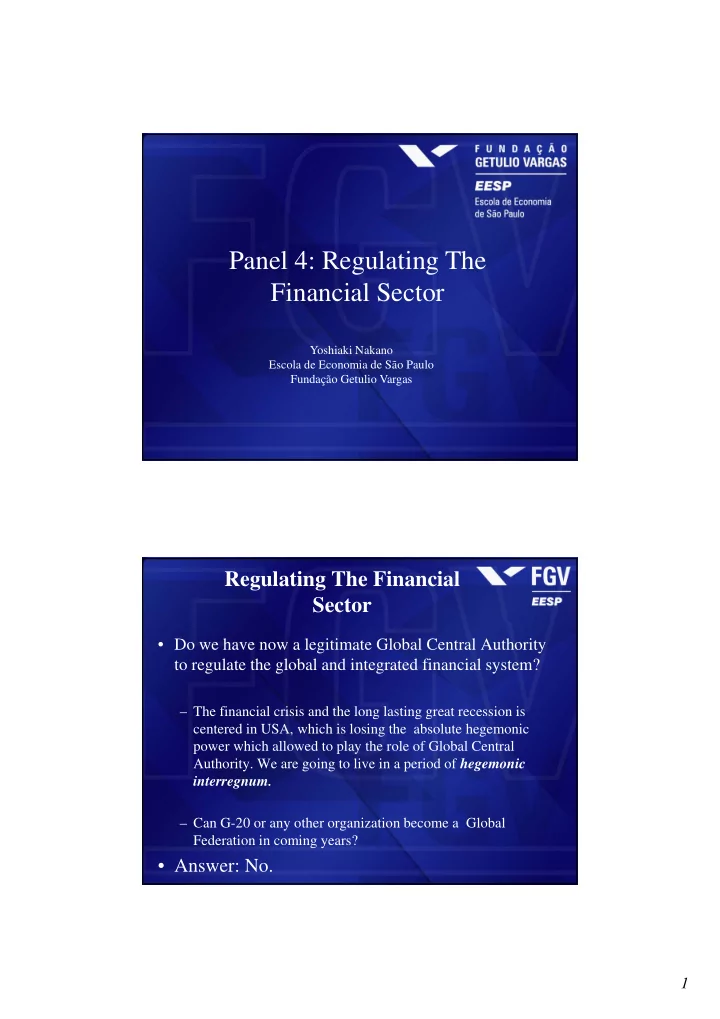

Panel 4: Regulating The Financial Sector Yoshiaki Nakano Escola de Economia de São Paulo Fundação Getulio Vargas Regulating The Financial Sector • Do we have now a legitimate Global Central Authority to regulate the global and integrated financial system? – The financial crisis and the long lasting great recession is centered in USA, which is losing the absolute hegemonic power which allowed to play the role of Global Central Authority. We are going to live in a period of hegemonic interregnum. – Can G-20 or any other organization become a Global Federation in coming years? • Answer: No. 1
So, What Are the Rules of the Game? • Each national government will have to regulate financial sector in a context of financial and currency war . • US has already a large public deficit and debt their expansion has political constraint and can decrease the credibility of dollar. • And so US are depreciating de dollar to increase net exports and recover employment. So, What Are the Rules of the Game? • But to remain hegemonic power must protect dollar as international reserve money. And this issue became national security priority. • On other side China, Russia, Japan and other countries has a huge amount of foreign reserves in dollar nand other dangerous weapon in a financial war. 2
Historical Parallel • In the hegemonic interregnum between first and second World War with the decline of British Empire and ascent of American Empire has some historical similarities with the present period. Historical Parallel • In this period between first and second world war we have: – Currency war and inflation. – Financial crises of 1929 and Great Depression. – Rise of nationalism, protectionism and authoritarian governments. – Decline of British financial plutocracy and rise of American industrial plutocracy. 3
Historical Parallel • What happened in this period of hegemonic interregnum in peripheral countries like Brazil? – With weak link between center and periphery, decline of trade and foreign investment, there was a reduction in transfer of resources to the center and periphery had prosperity. (Ander Gunther Frank) Historical Parallel • What happened in this period of hegemonic interregnum in peripheral countries like Brazil? – With decline in the value of exports and devaluation of exchange rate and fiscal policy which maintained the domestic demand we have import substitution industrialization. (Celso Furtado) – Big crisis can put in movement some mechanism of development, with devaluation etc.(Albert Hirschman) 4
Historical Parallel • “For most Latin American countries, the 1930s and early 1940s were “the worst of times and the best of times”. Active countries steadily gained both ability and will to maintain growth regardless of foreign conditions, learning to rely on domestic finance for capital formation and developing creative policies. Passive countries regressed. (Carlos Diaz-Alejandro). • This time is different: worst of times for developed countries and good times for emergent countries. Decline of US Empire and Western World and Rise of China • Change of dominant ideology and paradigm? • Does it means decline of neo-liberal globalization and rise of state capitalism? 5
Decline of US Empire and Western World and Rise of China • Can dependent countries like Brazil become active player and transform in a developed and modern national state? • Can countries with colonial past like Brazil think by themselves and develop creative and long term policies and strategies to fight the financial and currency war? Good Times in Emerging Countries • With the financial crisis of 2008 and great recession we have a role reversal: – Resources keeps flowing from emerging countries to developed countries – Higher growth of emerging countries. – Greater indebtedness of developed countries. 6
Good Times in Emerging Countries • The emerging countries has today greater external autonomy and lower external fragility, specially to devaluation of exchange rate: – External liabilities with lower risk: FDI and portfolio investment. – Government debt in local currency. – Wealthy in natural resources, commodities and energy. Currency and Financial War • The US government by elimination of consumption, investment and public sector spending as locomotive to recover the economy announced officially (Obama in the State of Union on January 27, 2010) the National Export Initiative to double the US exports in 5 years. 7
Currency and Financial War • Consequences of QE on emerging countries : – Using “exorbitant privilege” and ‘carry trade”, US banks are buying real and less risky assets. – Huge inflows of capital are overvaluating the exchange rate, generating credit boom, asset and commodities price bubbles and inflation. Currency and Financial War • US Department of Defense simulated a currency war game in March 2009 and Lawrence Summers and Christina Romer get to the same conclusion. • This announcement gave transparency to FED`s monetary policy of zero interest rate and QE: devaluation of dollar. 8
Currency and Financial War • Consequences of QE on emerging countries : – Overvaluation of exchange rate raising real wage, are transferring resources to and inflating the service sector and de-industrializing emerging countries like Brazil. – Choice for non-active countries is between: overvaluation, inflation or more protection, or combination of three. Coming years will be “worst of times”. – For active countries coming years can be transformed to “best of times”. 9
Recommend
More recommend